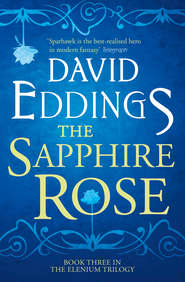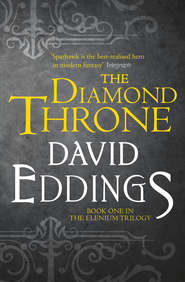По всем вопросам обращайтесь на: info@litportal.ru
(©) 2003-2025.
✖
The Ruby Knight
Автор
Год написания книги
2019
Настройки чтения
Размер шрифта
Высота строк
Поля
Chapter 10
The rain was slackening, and a fitful breeze was coming…
Chapter 11
They slept late the following morning. Sparhawk awoke before daybreak,…
Chapter 12
Their mood was very bleak the following morning as they…
Chapter 13
Because the road they proposed to follow was reputed to…
Chapter 14
The corridor into which the surly gate-guard led them was…
Chapter 15
‘How did she get out of that tower?’ Sparhawk asked…
Chapter 16
They removed their armour and put on the plain workmen’s…
Chapter 17
‘I am eternally in your debt, my friends,’ Ghasek said…
Part Three: The Troll Cave
Chapter 18
‘Was that really Azash?’ Kalten asked in awe.
Chapter 19
Sparhawk sat in the room he shared with Kalten, poring…
Chapter 20
They dragged the husk of the Seeker off the road…
Chapter 21
Promptly at noon, King Soros of Pelosia called a halt.
Chapter 22
It seemed that it took them two more weeks to…
Chapter 23
It was that same peculiarly drowsy melody Flute had played…
Chapter 24
They rode out at first light, circled through the forest…
Chapter 25
The cave had the musty smell of long-damp earth and…
About the Author
Author's Note
Other Books by David Eddings
About the Publisher
Map
Prologue
A history of the House of Sparhawk
From the Chronicles of the Pandion Brotherhood
It was in the twenty-fifth century when the hordes of Otha of Zemoch invaded the Elene kingdoms of western Eosia and swept all before them with fire and sword in their march to the west. Otha appeared invincible until his forces were met on the great, smoke-shrouded battlefield at Lake Randera by the combined armies of the western kingdoms and the concerted might of the Knights of the Church. The battle there in central Lamorkand is said to have raged for weeks before the invading Zemochs were finally pushed back and turned to flee for their own borders.
The victory of the Elenes was thus complete, but fully half of the Church Knights lay slain upon the battlefield, and the armies of the Elene kings numbered their dead by the scores of thousands. When the victorious but exhausted survivors returned to their homes, they faced an even grimmer foe – the famine which is one of the common results of war.
The famine in Eosia endured for generations, threatening at times to depopulate the continent. Inevitably, social organization began to break down, and political chaos reigned in the Elene kingdoms. Rogue barons paid only lip service to their oaths of fealty to their kings. Private disputes often resulted in ugly little wars, and open banditry was common. These conditions generally prevailed until well into the early years of the twenty-seventh century.
It was in this time of turmoil that an acolyte appeared at the gates of our Mother-house at Demos expressing an earnest desire to become a member of our order. As his training began, our Preceptor soon realized that this young postulant, Sparhawk by name, was no ordinary man. He quickly outstripped his fellow novices and even mastered seasoned Pandions on the practice field. It was not merely his physical prowess, however, which so distinguished him, since his intellectual gifts were also towering. His aptitude for the secrets of Styricum was the delight of his tutor in those arts, and the aged Styric instructor guided his pupil into areas of magic far beyond those customarily taught the Pandion Knights. The Patriarch of Demos was no less enthusiastic about the intellect of this novice, and by the time Sir Sparhawk had won his spurs, he was also skilled in the intricacies of philosophy and theological disputation.
It was at about the time that Sir Sparhawk was knighted that the youthful King Antor ascended the Elenian throne in Cimmura, and the lives of the two young men soon became intricately intertwined. King Antor was a rash, even foolhardy youth, and an outbreak of banditry along his northern border enraged him to the point where he threw caution to the winds and mounted a punitive expedition into that portion of his kingdom with a woefully inadequate force. When word of this reached Demos, the Preceptor of the Pandion Knights dispatched a relief column to rush north to the King’s aid, and among the knights in that column was Sir Sparhawk.
King Antor was soon far out of his depth. Although no one can dispute his personal bravery, his lack of experience often led him into serious tactical and strategic blunders. Since he was oblivious to the alliances between the various bandit barons of the northern marches, he oft-times led his men against one of them without giving thought to the fact that another was very likely to come to the aid of his ally. Thus, King Antor’s already seriously outnumbered force was steadily whittled down by surprise attacks directed at the rear of his army. The barons of the north gleefully outflanked him again and again as he charged blindly forward, and they steadily decimated his reserves.
And so it stood when Sparhawk and the other Pandion Knights arrived in the war-zone. The armies which had been so sorely pressing the young king were largely untrained, a rabble recruited from local robber-bands. The barons who led them fell back to take stock of the situation. Although their numbers were still overwhelming, the reputed skill of the Pandions on the battlefield was something to be taken into account. A few of their number, made rash by their previous successes, urged their allies to press the attack, but older and wiser men advised caution. It is certain that a fair number of the barons, young and old alike, saw the way to the throne of Elenia opening before them. Should King Antor fall in battle, his crown might easily become the property of any man strong enough to wrest it from his companions.
The barons’ first attacks on the combined forces of the Pandions and King Antor’s troops were tentative, more in the nature of tests of the strength and resolve of the Church Knights and their allies. When it became evident that the response was in large measure defensive, these assaults grew more serious, and ultimately there was a pitched battle not far from the Pelosian border. As soon as it became evident that the barons were committing their full forces to the struggle, the Pandions reacted with their customary savagery. The defensive posture they had adopted during the first probing attacks had been clearly a ruse designed to lure the barons into an all-out confrontation.
The battle raged for the better part of a spring day, and late in the afternoon when bright sunlight flooded the field, King Antor became separated from the troops of his household guard. He found himself horseless and hard-pressed, and he resolved to sell his life as dearly as possible. It was at this point that Sir Sparhawk entered the fray. He quickly cut his way through to the king’s side, and, in the fashion as old as the history of warfare, the two stood back to back, holding off their foes. The combination of Antor’s headstrong bravery and Sparhawk’s skill was convincing enough to hold their enemies at bay until, by mischance, Sparhawk’s sword was broken. With triumphant shouts the force encircling the two rushed in for the kill. This proved to be a fatal error.











